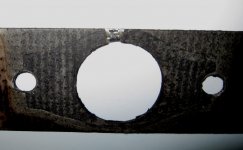DanLewis
Jedi Trainee
Offline
Here's a curious problem that hopefully one of you recognize and can help me solve:
At idle, cylinder #3 is not firing. I can pull the plug wire and there's no change in the way the car idles. However, at about 1500 RPM and above, everything is fine. I can cruise at 70 with plenty of power, so I know it's firing on all 4.
The plugs are not fouled, they're gapped at .025", I've tried changing the plug wires - all to no avail. The distributor is a brand new electronic distributor, so there are no points to worry about. I've removed the cap and cleaned the contacts as well as the rotor - no difference.
The only things I can think of that could cause it and haven't been tested are (1) a bad cap (although I would expect this to cause the problem at high rpms too), or (2) some sort of fuel delivery problem at low rpms - like maybe the intake valve isn't opening far enough. If I give it a little choke to make the mixture richer at idle, the problem seems to improve considerably, but of course that's not a permanent solution.
So am I right - do I probably need to check the valve adjustments? I haven't done a compression test, but thought checking the valve lash would be the more obvious first step. The engine has only about 1,500 miles on it since it was rebuilt, so I've been reluctant to assume that it's valve adjustments so early - but then who knows?
Oh - one more thing, perhaps important: The day before this began I removed the Weber DGV downdraft carb and intake manifold so that I could re-install my Weber 40DCOE sidedraft carb (and of course a different intake manifold). Would a bad seal (i.e., a vacuum leak) cause this problem?
Any insights would be appreciated!
Dan
At idle, cylinder #3 is not firing. I can pull the plug wire and there's no change in the way the car idles. However, at about 1500 RPM and above, everything is fine. I can cruise at 70 with plenty of power, so I know it's firing on all 4.
The plugs are not fouled, they're gapped at .025", I've tried changing the plug wires - all to no avail. The distributor is a brand new electronic distributor, so there are no points to worry about. I've removed the cap and cleaned the contacts as well as the rotor - no difference.
The only things I can think of that could cause it and haven't been tested are (1) a bad cap (although I would expect this to cause the problem at high rpms too), or (2) some sort of fuel delivery problem at low rpms - like maybe the intake valve isn't opening far enough. If I give it a little choke to make the mixture richer at idle, the problem seems to improve considerably, but of course that's not a permanent solution.
So am I right - do I probably need to check the valve adjustments? I haven't done a compression test, but thought checking the valve lash would be the more obvious first step. The engine has only about 1,500 miles on it since it was rebuilt, so I've been reluctant to assume that it's valve adjustments so early - but then who knows?
Oh - one more thing, perhaps important: The day before this began I removed the Weber DGV downdraft carb and intake manifold so that I could re-install my Weber 40DCOE sidedraft carb (and of course a different intake manifold). Would a bad seal (i.e., a vacuum leak) cause this problem?
Any insights would be appreciated!

Dan

 Hi Guest!
Hi Guest!

 smilie in place of the real @
smilie in place of the real @
 Pretty Please - add it to our Events forum(s) and add to the calendar! >>
Pretty Please - add it to our Events forum(s) and add to the calendar! >> 

